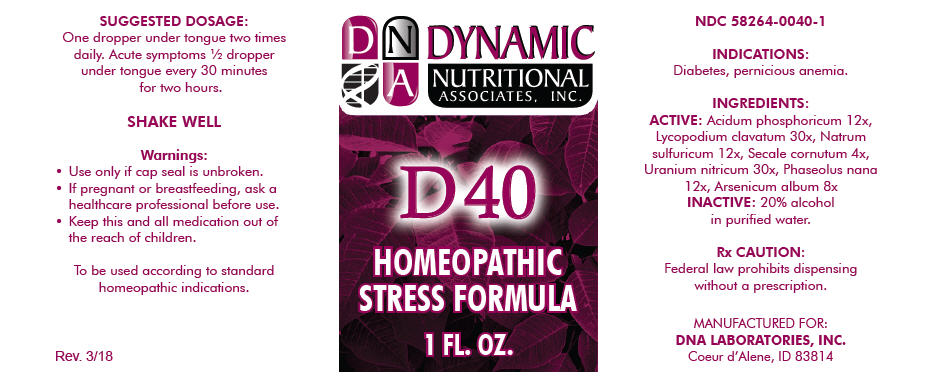
D-40 while Breastfeeding
What is D-40 used for?
Brief: Diabetes, pernicious anemia.
Is D-40 usage safe while breastfeeding? If a lactating mother is using it can there be any effect on growth or development of infant?

D-40 Breastfeeding Analsys
Lycopodium clavatum spore while Breastfeeding
UnsafeAerial summits and spores of this fern are used. Traditionally use as a diuretic and intestinal spasm relief drug. Also used for abrasions and skin irritation. It may be a cause of asthma and contact dermatitis.
Sodium sulfate while Breastfeeding
SafeCAS Number: 7727-73-3
Osmotic laxatives are often used to cleanse the bowel before medical procedures.They base their action on the very little or nothing they are absorbed and by this means forcing the water to enter the intestine with the result of watery diarrhea. At latest update no published data on excretion into breast milk were found. Another laxative with similar estructure which is Sodium Picosulfate (see specific info) is not excreted into breast milk Be aware of drinking enough fluids to avoid dehydration of the nursing mother who is already loosing water by producing about 1 liter of milk a day.
Claviceps purpurea sclerotium while Breastfeeding
DangerousCAS Number: 84775-56-4
A parasitic fungus from the ear of some cereals, particularly rye, which since ancient times has caused epidemics of a serious disease, ergotism (Florea 2017, Belser 2013, Lee 2009). It has a complex composition, highlighting the ergoline alkaloids: lysergic acid amides such as ergometrine and ergopeptines such as ergotamine and ergotoxine (Florea 2017, Hulvová 2013) that act on adrenergic, dopaminergic and serotonergic receptors. Since the last update, we have not found published data on its excretion in breast milk. Ergot alkaloids have oxytocic, vasoconstrictive and lactation-inhibiting effects by inhibiting prolactin, among many others (Florea 2017, Hulvová 2013, Lee 2010, Lee 2009). Indications from the German Ministry of Health’s Commission E: none. Due to its serious adverse reactions and toxicity, natural alkaloids are not used in therapy, and there are recommendations for their withdrawal from sale (EMA 2014). At present, semisynthetic derivatives such as methylergometrine, dihydroergotamine, dihydroergocristine, bromocriptine and lisuride are used, among others. See below the information of these related products:
Arsenic trioxide while Breastfeeding
DangerousUsed in the treatment of promyelocitic leukemia in adults.
D-40 Breastfeeding Analsys - 2
Arsenic trioxide while Breastfeeding
CAS Number: 1327-53-3
Most sources consider breastfeeding to be contraindicated during maternal antineoplastic drug therapy. It might be possible to breastfeed safely during intermittent therapy with an appropriate period of breastfeeding abstinence; the manufacturer recommends an abstinence period of 1 week after the last dose. Chemotherapy may adversely affect the normal microbiome and chemical makeup of breastmilk.[1] Women who receive chemotherapy during pregnancy are more likely to have difficulty nursing their infant.[2]
D-40 Breastfeeding Analsys - 3
Phosphoric acid and Breastfeeding
SafeNext to calcium, phosphorus is the most abundant mineral in the body, making up about 1% of total body weight. Calcium, which gives strength to bones and teeth, needs to be combined with another mineral, such as phosphorous, to become stabilized before it can be effective.
Phosphorus also helps to release energy from food as it plays an important role in the metabolism of carbohydrate, fat and protein. Phosphorus is naturally found in many food sources and phosphorus supplementation while breastfeeding is mostly safe.
You can easily get all the phosphorus you need from a well-balanced diet (even though most prenatal vitamins dont contain phosphorus). For example, 2 cup of yogurt provides nearly all your phosphorus for the day.
Warning: Consuming high doses of phosphorus for a short time can cause diarrhea or stomach pain. The long term over-consumption of foods high in phosphorus can deplete calcium resources and lead to reduced bone mass, which means that bones are more likely to fracture.What if I already have used D-40?
Due to high dilution of ingredients in homeopathic medicines they do not create much problem for baby. D-40 is a homeopathic medicine and if your baby does not have any abnormal symptoms then there is nothing to worry about. Be careful with too much usage of ethanol based homeopathic medicines during breastfeeding.
I am nursing mother and my doctor has suggested me to use D-40, is it safe?
Homeopathic medicines are usually safe in breastfeeding and if D-40 has been recommended by doctor then there should be no concern about its usage in breastfeeding.
If I am using D-40, will my baby need extra monitoring?
Not exactly.
Who can I talk to if I have questions about usage of D-40 in breastfeeding?
US
National Womens Health and Breastfeeding Helpline: 800-994-9662 (TDD 888-220-5446) 9 a.m. and 6 p.m. ET, Monday through Friday
UK
National Breastfeeding Helpline: 0300-100-0212 9.30am to 9.30pm, daily
Association of Breastfeeding Mothers: 0300-330-5453
La Leche League: 0345-120-2918
The Breastfeeding Network supporter line in Bengali and Sylheti: 0300-456-2421
National Childbirth Trust (NCT): 0300-330-0700
Australia
National Breastfeeding Helpline: 1800-686-268 24 hours a day, 7 days a week
Canada
Telehealth Ontario for breastfeeding: 1-866-797-0000 24 hours a day, 7 days a week
